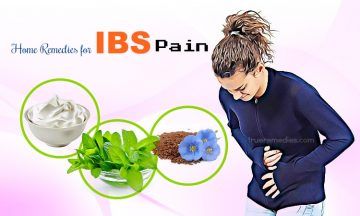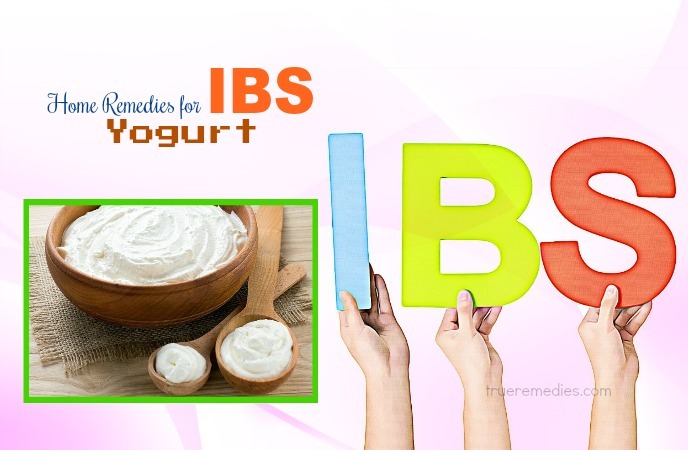updated: 11/15/2019
CONTENTS
IBS stands for irritable bowel syndrome[1]. Irritable bowel syndrome, which is a gastrointestinal disease, has yet to be precisely identified. This syndrome is often referred to by other names such as functional colon disease or colonic inflammation. This is a very common disease in the world. The syndrome affects about 10-20 % of the population in the world and it is more common in women than men[2]. This syndrome is not dangerous but it has a lot of influence on the quality of life. We know that the reason you are reading this article of 14 natural home remedies for IBS pain is to learn how to treat this syndrome at home, but before that, you had better understand some basic information about this problem. That way, you can deal with it the right way.
- 12 Natural Home Remedies For Abdomen Pain After Childbirth (Postpartum)
- 10 Natural Home Remedies For Belching And Bloating
- 24 Natural Tips On How To Get Rid Of Diarrhea Overnight
What Is IBS?
Irritable Bowel Syndrome (IBS) is a functional gastrointestinal disorder that affects the large intestine (colon). Irritable bowel syndrome often causes abdominal pain, bloating, diarrhea, and constipation. Food in the digestive tract goes from the small intestine to the large intestine. The main function of the large intestine is to absorb water and push the stool out by the muscles contraction. In people with irritable bowel syndrome, this contraction will occur abnormally. Excessive muscle spasms cause diarrhea. In contrast, slowed or spastic muscle contraction will lead to constipation. Uncontrolled and abnormal cramps may cause abdominal pain or the urge to go to the bathroom immediately. Irritable bowel syndrome causes disorders such as anxiety, severe depression, or fatigue. Although irritable bowel syndrome causes lot of discomfort to patients, it does not cause permanent damage to the large intestine.
Irritable bowel syndromes are divided into four main groups: IBS-D (or diarrhea), IBS-C (or constipation), IBS-M (both regular diarrhea and constant constipation), and IBS-U (not often with diarrhea and constipation).
Most people with irritable bowel syndrome find that the symptoms improve as they learn to control the condition. Only a small number of people with irritable bowel syndrome have severe signs and symptoms.
Fortunately, unlike other serious intestinal diseases such as ulcerative colitis or Crohn, irritable bowel syndrome doesn’t cause inflammation or changes in intestinal tissue or increase the risk of colorectal cancer. In many cases, it is possible to control irritable bowel syndrome by managing lifestyle, changing diet, and controlling stress.
TrueRemedies Partner Solutions

Need a Help from the Leading Expert Online, Available 24/7?
They’re all here and ready to answer your questions online or by phone. Keep asking questions until you get the answer you need.
What Are Common Causes Of IBS?
The precise reason for IBS is unknown. Factors that also play a role are:
- Muscle contractions in your intestine: The intestinal walls are lined with muscle layers that contract when they move food through the digestive tract. Strong and long-lasting intestinal contractions may cause bloating, gas, and diarrhea. In contrast, weak contractions may slow food passage and result in hard, dry stools.
- Inflammation in your intestines: Some IBS patients have an increase in immune-system cells in the intestines. This response of the immune system is related to pain and diarrhea.
- Nervous system: Nervous system abnormalities in the digestive system may cause patients to experience greater discomfort than normal when their abdomen stretches due to stool or gas. Poor interaction between your brain and your digestive system may cause the body to overreact to certain changes that often occur in the process of digestion, leading to abdominal pain, diarrhea, or constipation.
- Changes in good bacteria (microflora) in the gut: Microflora resides in the intestines and plays a crucial role in health. Research notes that microflora in people who suffer from IBS and microflora in healthy people might be different.
- Severe infection: You may suffer from IBS after a severe turn of diarrhea that is caused by a virus or bacteria. Also, IBS might result from bacterial overgrowth in the intestines.
Additionally, IBS may be triggered by:
- Food sensitivity: Many people reported that IBS symptoms get worse when they drink or eat certain beverages or foods, including milk, carbonated drinks, wheat, citrus fruits, dairy products, beans, cabbage, etc.
- Stress: People who suffer from IBS experience worse signs and symptoms when they have increased stress. Remember that stress may exacerbate symptoms, but it does not cause them.
- Hormones: Women are likely to suffer from IBS than men, which indicates that hormonal changes are a trigger. Many women with IBS get worse signs and symptoms during their menstrual periods.
What Are Symptoms Of IBS?
Symptoms of irritable bowel syndrome usually change over time and often vary from person to person.
- Abdominal pain or discomfort in the abdomen (or abdominal distension), patients may feel comfortable after going to the bathroom. This condition usually tends to decrease after every bowel movement.
- A change in bowel habits: More than 3 times a day or less than 3 times a week.
- Unusual stools: Loose stools or constipation or alternating loose stools, constipation, and normal, repeated process several times. The stools have nasal mucus and no blood. The process of using the toilet is abnormal; for example, rushing to the toilet, trying to push the stool out, etc.
These symptoms last for at least 12 weeks or for 12 months (they are not necessarily continuous).
Note that: Symptoms that are often misunderstood as symptoms of irritable bowel syndrome include blood in the stool or in the urine, vomiting, abdominal pain, fever, weight loss, or diarrhea.
Who Is At Risk Of IBS?
You are at high risk for IBS if:
- Age: Irritable bowel syndrome usually develops in people under the age of 45.
- Gender: Women are more likely than men to have IBS.
- Genetic factors: If your family has someone with irritable bowel syndrome, then you also likely develop this syndrome.
- Mental health problems: such as anxiety, major depression, chronic fatigue syndrome, personality disorder, or sexual abuse in adolescence
When To See A Doctor?
Irritable bowel syndrome affects each person in a different way. If you have irritable bowel syndrome but suddenly have abnormalities, consult your doctor. You should visit a health care facility promptly for treatment when the symptoms become severe.
Also, if you have symptoms such as blood in the stool or urine, vomiting, black stools like tar, severe diarrhea, etc., you need to see physicians immediately.
To prevent or treat this syndrome, many people often resort to unscientific ways. Although they cost you time and money, they hardly improve your condition. Therefore, this article aims to provide you with the most basic knowledge about irritable bowel syndrome, and at the same time provide you with very scientific and effective remedies for this syndrome that you can do easily at home. It is time to find out what the best natural home remedies for IBS pain are. Take a look at TrueRemedies.com!
Top 14 Home Remedies For IBS Pain: Must-Try Natural Treatments For IBS Pain
1. Yogurt
Among natural remedies for IBS, yogurt is one of the most effective. Yogurt contains a type of “living bacteria” that protects the stomach, creating lactic acid to eliminate toxins from the body. Yogurt, which is obtained when lactic fermented animal milk, has many benefits to your health. Thanks to the lactic fermentation process, a portion of the protein in the milk is broken down into amino acids, which are converted into lactose sugars easily digested. A large amount of lactic acid in yogurt has a beneficial effect on treating intestinal diseases, gastritis, and digestive diseases[3]. Yogurt is suitable for the elderly, children, and especially those with digestive diseases.
Recent studies have recommended that probiotics may help to treat IBS[4] [5]. According to a clinical trial in 2011 in 122 people suffering from IBS, a probiotic tablet noticeably reduced symptoms of IBS in 47 % of participants who took the probiotic within four weeks[6].
So, how to use yogurt properly, especially how to prevent or reduce the symptoms of irritable bowel syndrome? You simply pay attention to some of the following guides:
- Time
You can eat yogurt after a daily meal or consume half a teaspoon of psyllium or bisabolol (available at drugstores) with 1 cup of yogurt 1 hour after your lunch and dinner.
- Amount
Although yogurt is good for health, you need to pay attention to giving it for your baby. Because the digestive system of babies is very weak, you should give yogurt to babies at least 6 months of age with the appropriate dose:
Children 6-10 months old: 50 grams/day
Children 1-2 years old: 80 grams/day
Children over 2 years old: 100 grams/day
For children who have grown up, they may be eating more than 100 grams of yogurt per day, but they should not eat too much because it will cause gastrointestinal symptoms.
- Things To Consider After Eating Yogurt
You need to clean your mouth after eating yogurt because the beneficial bacteria in yogurt are very active; so, it is very easy to damage enamel, especially enamel of children.
- Combined With Other Foods
When combined with the right foods, yogurt becomes more attractive, tastier, and much more appetizing. You can combine it with starchy foods for breakfast, such as rice, pasta, dumplings, bread, sweet potato cakes, pumpkin dishes, etc. or some fruits such as apples, peaches, bananas, butter, strawberries, or pears.
- Avoid Combining Yogurt With Some Foods Below:
Avoid eating yogurt when taking some antibiotics such as chloramphenicol or erythromycin, because they may kill lactobacillus bacteria in yogurt.
You also should not eat yogurt with processed foods such as sausages, smoked meats, or processed frozen foods since they may cause constipation, stomach aches, and even death.
- Do Not Heat Yogurt Before Eating
Because of the concern that children who eat cold yogurt may have coughs and sore throats, you warm up the yogurt before feeding them. However, this may decrease the function of beneficial bacteria and affect the nutrient content in yogurt. You can also give children yogurt to eat in the winter after taking it out of the refrigerator for about 30-45 minutes to cool it down.
Using yogurt properly over a period of time, you will notice that the symptoms of irritable bowel syndrome are significantly reduced or are no longer present.
2. Flaxseed
Flaxseeds contain an abundant number of fibers needed for the removal of waste in the body. In addition, flaxseeds are also a good source of omega 3 fatty acids. Perhaps the most significant benefit of flaxseeds is its ability to promote digestion. Alpha lipoic acid in flaxseeds may help protect the gastrointestinal mucosa and maintain digestive health. It has been shown to benefit people with Crohn’s and other digestive diseases, as it may help relieve the symptoms of irritable bowel syndrome[7] [8]. Not only that, but flaxseed may also support the treatment of diseases associated with gastritis, duodenal inflammation, intestinal inflammation, and colon inflammation.
- Take 1 tablespoon of freshly ground flaxseeds to mix with warm water. Take 1 cup every day to get the best effect.
- Besides, you can mix flaxseeds with boiling water for about 10 minutes and sip this cup of hot water before going to sleep.
- Or you can add the flaxseeds to a glass of water, soak for 2-3 hours, and then drink.
Drink flaxseed every day before going to bed to promote smooth bowel movements and clean the stomach.
3. Mint
This is another must-try home treatment in this list of home remedies for IBS pain. Mint is able to increase appetite and stimulate digestion; so, if you have problems related to digestive disorders, you can use mint as a natural remedy to reduce gastrointestinal symptoms.
Mint reduces the symptoms of irritable bowel syndrome[9] [10] such as abdominal distension, belching, diarrhea, or stomach cramps. According to a study published in the British Medical Journal, peppermint oil is effective in fighting against the smooth muscle contraction of the gastrointestinal tract and reducing swelling, intestinal tightness, and epigastric pain[11].
- Add 2 or 3 drops of peppermint oil to ¼ cup of warm water. Drink 3 or 4 glasses of water each day. Continuously repeat the method until your condition is improved.
- In addition, patients can mix one teaspoon of dried mint in a glass of boiling water, for about 10 minutes. Drink 2-3 times a day.
Note that: When drinking mint tea, you should only use a moderate amount. Avoid excessive use because they may cause nausea, gastric congestion, or anorexia.
4. Dill
This remedy is one of the little-known home remedies for IBS. Dill seeds are a good source of minerals and vitamins such as vitamin C, vitamin B3, manganese, potassium, calcium, magnesium, and iron. In 100 grams of dill seeds provide over 150% of the fiber that the body needs every day. Fiber helps to increase metabolism, support digestion, cleanse the colon, and reduce constipation[12] [13].
The seeds of the dill help reduce tight stomach and bloating. It also plays an important role in eliminating fat from the digestive system, inhibiting the overproduction of mucus in the intestines.
The seeds of the dill help to relieve the pain associated with the digestive system, which is very useful for people with irritable bowel syndrome[14]. This is also a great remedy to overcome the symptoms of stomach pain and flatulence.
For constipation, especially in young children, if patients cannot take medicine, you can give your child a cup of dill juice to help children prevent digestive disorders and help children sleep better.
- Crush 1 tablespoon of the seeds of the dill
- Mix with 1 cup of boiling water
- Wait for about 10 minutes, and then you can drink
Drinking 2-3 cups of this tea a day is a way to prevent and reduce the symptoms of IBS and stomach ulcers effectively and safely.
Note that: Avoid using dill seeds in large doses. Compounds in dill may cause neurological issues, hallucinogenic damage, and convulsive condition if overused. It may exacerbate estrogen-receptor-linked cancers such as endometrium, breast, or ovaries because it has high estrogen content. Pregnant women may be advised to avoid eating dill in large amounts.
5. Sweet Potato
Sweet potato may reduce the symptoms of irritable bowel syndrome. Sweet potatoes have a mild soothing effect, and they help treat stomach ulcers because they contain lots of vitamin B, vitamin C, potassium, beta carotene, and calcium. The fiber in sweet potato helps prevent constipation and control acid levels in the stomach; so, it also contributes to reducing gastric pain and ulcer[15].
Sweet potatoes may also stimulate digestion and treat constipation[16]. The simplest way is to eat boiled sweet potatoes. Eating sweet potatoes at a moderate level (100 grams per day) is very beneficial for the digestive system because vitamin C and amino acids in sweet potatoes help to stimulate the bowel movement, make digestion of food become faster, and prevent constipation. In addition, to treat constipation, you can also drink boiled sweet potato juice (you must wash its shell clearly). However, eating too much sweet potato will also cause abdominal obesity.
Lunch is an ideal time to eat sweet potato because the calcium content of sweet potatoes is absorbed by the body 4 to 5 hours of eating. On the other hand, the sunlight in the afternoon is good for promoting the body’s absorption of calcium. When the body absorbs the required amount of calcium, it is also time to enjoy dinner.
However, do not eat sweet potatoes with persimmons because the sugar in sweet potatoes will ferment in the stomach, thereby increasing the gastric acid. These acid enzymes combined with the tannin found in persimmons cause a precipitate reaction that damages the stomach, leading to peptic bleeding or ulcer.
6. Banana
The next treatment in this list of remedies for IBS is using banana. Bananas help restore bowel function, provide electrolyte and potassium loss due to diarrhea. A medium-sized banana contains around 3 grams of fiber, which makes bananas a good fiber source to aid digestion[17]. Eating bananas is very good for people suffering from stomach aches. Especially green bananas are used to treat stomach pain as it helps to reduce the acid level and relieve gastric irritation by protecting the stomach with a smooth layer of its viscous texture into the gastric mucosa. Bananas have high fiber content; so, it has a laxative effect, and it is also good for treating intestinal disorders such as constipation.
Bananas are rich in B vitamins that relax the nerves. At the same time if you are under pressure, eat bananas to calm your heart rate, adjust your water balance, and change the amount of oxygen to your brain. All that makes you feel better. Obviously, bananas provide you with a lot of physical and mental benefits, which not all fruits do.
Additionally, several test-tube studies suggest that pectin may aid in protecting against colon cancer[18] [19]
Frequent eating bananas will help you prevent or reduce the symptoms of irritable bowel syndrome.
7. Ginger
This is reckoned one of the best remedies for IBS. Ginger has long been used as a safe way to relieve nausea, vomiting, motion sickness, flatulence, loss of appetite, and abdominal pain[20] [21] [22]. However, you should use ginger at a moderate level, because using a lot of ginger may be counterproductive. Using more than 2g – 4g of ginger a day may cause heartburn. Modern studies have also shown that ginger is effective in treating gastric pain, peptic ulcer disease without the use of drugs, especially without causing side effects[23] [24].
In addition, scientists have discovered that the bitterness of fresh ginger has some compounds such as 6-Zingiberol, Methadone (Amidon), Ginger oil, etc. They all have the effect of inhibiting the composition of Prostaglandin – hormones that cause the contractions. Ginger has a good effect on boosting digestion[25].
Patients with stomach pain symptoms, such as nausea, anorexia, abdominal pain, gastrointestinal disorders, can use one of the remedies from ginger below to get relief.
Method 1. Drink Ginger Tea
Add some slices of fresh ginger to your tea and drink it every morning to help prevent nausea, especially stomach aches, thereby reducing the symptoms of irritable bowel syndrome.
Method 2. Soak Ginger With Vinegar
- Rinse fresh ginger and slice ginger into thin slices. Note that, you should not remove the shell of ginger
- Put ginger in a jar and add vinegar to it
- Soaking these slices for about 7 days. This mixture should be stored in a cool and dry place. You can store it in the refrigerator.
When having a stomach ache, you should eat 2-4 slices of ginger to relieve the pain. Besides, eating ginger also helps prevent digestive disorders.
Method 3. Ginger, Lemon, And Honey
- Squeeze ginger to have fresh ginger juice
- Mix fresh ginger juice, lime juice, and 1 teaspoon of honey to a cup of water and stir well
- Drink it
Drink this water every morning to relieve your stomach pain. You can also add ginger to the daily dishes. This not only creates a flavor for the dishes but also helps prevent or reduce the symptoms of irritable bowel syndrome.
Notes:
- You should not use ginger with aspirin and coumarin (at least 4 hours apart).
- Avoid ginger if you have hemorrhage or haemorrhage, nosebleeds, coughing up blood, etc.
- People with heat stroke, sweating, or high fever (but no feeling of cold) should not use ginger.
8. Cabbage
The next one in this of remedies for IBS. Cabbage is rich in minerals, especially calcium, phosphorus, potassium, and iron. The amount of vitamin C in cabbage is 4.5 times that of carrots and 3.6 times that of potatoes and onions. In this vegetable, vitamin C is available with vitamin P as a PC complex. Vitamin C is protected from oxidation by vitamin P; so, it has a higher biological value than vitamin C. Cabbage juice may treat peptic ulcers quite effectively[26].
Experts in India have demonstrated the formation of gastric mucosa with protective functions and mucosal regeneration under the effect of some of the active ingredients found in fresh cabbage. Using cabbage vegetable juice reduces the symptoms of irritable bowel syndrome because they help to heal peptic ulcers. A study conducted on 40 people with peptic ulcer, they drank a cup of cabbage juice (equivalent to ¼ liter) for 3 weeks. The endoscopic results showed that gastric ulcers had gradually recovered.
Drink 1000ml of cabbage juice daily for several times to achieve the results you want. You can add salt or sugar as per your taste to make it easier to drink. Drink cabbage juice instead of water every day within two months. Cabbage juice does not cause any complications; so, you can mix with other gastric drugs.
Notes: Drinking cabbage juice may cause bloating in some people. Therefore, you should pay attention to your own situation when applying this remedy to know whether it is suitable for you or not.
9. Oatmeal
With high fiber content, oatmeal is easy to digest and stimulates gastrointestinal motility in the stomach to digest food more easily. Eating oatmeal also helps to soften the stool, thereby preventing indigestion and constipation[27]. In addition, oatmeal also helps relieve stress very well.
To use oatmeal to treat the symptoms of irritable bowel syndrome, you can follow these guides:
- If you eat cereal in the morning, add oatmeal to your cereal
- Or you can add oatmeal to the water, boil to eat
- In addition, you can also add oatmeal to your yogurt or salad
- To relieve stress after a long day of tiring work, you can mix 5 teaspoons of oatmeal with 300ml boiling water and milk to drink. You will definitely feel more comfortable!
Note: When you start applying this remedy, you may feel flatulence. However, your body will gradually adjust, and the bloating will also disappear.
10. Chamomile
This is another must-try home treatment in this list of home remedies for IBS. Chamomile, according to Oriental Medicine, has been used for cooking soup, eating raw, caring for the skin, making a drinking solution, etc. Not only that, chamomile is also used to treat many diseases, including symptoms of irritable bowel syndrome[28] [29] [30]. Chamomile may reduce diarrhea – one of the symptoms of irritable bowel syndrome[31]. Chamomile is rich in vitamins, and it especially helps to relieve stomach spasm. In addition, chamomile also helps reduce bowel inflammation and cramps in the abdomen.
Using chamomile tea daily will help your body feel comfortable after hours of fatigue. Chamomile is a mild sedation. Chamomile tea is often used to treat stress; so, it can be so hot that it may relax the muscles, make the mood relaxed, and help you forget the stress.
- Prepare 2 or 3 teaspoons of the dried chamomile
- Add it to hot water
- After about 15-20 minutes, you can drink chamomile tea. You can add a few drops of lemon to taste
Please drink this tea two to three times a day for the best effect.
11. Carrots
Carrots are said to have many health benefits. Apart from making food, it also provides plenty of fibers to help prevent constipation[32]. The main insoluble fibers found in carrots are cellulose, lignin, and hemicellulose. Insoluble fibers may aid in reducing the risk of constipation and stimulate regular bowel movements[33]. Many people who use carrots get rid of constipation completely without taking medication.
The use of carrots to prevent or reduce the symptoms of irritable bowel syndrome is very simple. You can follow the methods below.
- Grate one carrot to have carrot juice. You can sugar to the carrot juice for easy drinking. Drink 2 cups a day to gradually reduce the signs of constipation.
- Grate one carrot with 1 teaspoon of sugar, 1 apple, 1 teaspoon of lemon juice, and 30 grams of water dropwort. You can put some ice cubes to grate together. Then, you have a glass of very delicious fruit juice with an abundant number of vitamins. Take 1 cup every day for 3 days to see how easy it is to remove constipation.
12. Green Tea
Green tea helps to promote the secretion of urine, which is great for detoxifying the body. The substances in green tea easily remove toxic substances in the blood and accelerate the discharge from the urine. Regular drink green tea may reduce the risk of some types of cancer, such as breast cancer[34], prostate cancer[35], and colorectal cancer[36], and lower blood pressure. Smokers drinking lots of green tea may minimize the effects of nicotine.
In addition to the application of home remedies above, the patient needs to take a hygienic diet regime to relieve the symptoms of irritable bowel syndrome. Patients should also avoid eating foods that increase the risk of IBS, such as coffee, beer, fiber, dairy products, avoid overeating, and avoid stress. The above mentioned home remedies for IBS are claimed to be able to reduce the symptoms of heavy or prolonged periods. Choose some of them and alternate them in your treating to see how effective they are. If you have any contributing ideas about our article, do not hesitate to drop your words below this post. We will answer as soon as we could.












